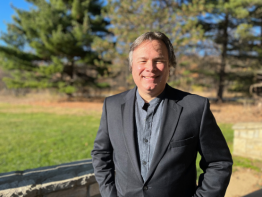

Introduce Yourself
My name is Stephen Renner, and for the past 25 years I have lived in the wonderful community known as Gahanna, Ohio, with my best friend and wife, Melissa. I completed my undergraduate degree at Otterbein College in 1993 with a BS in Chemistry and am now in the Voinovich School of Leadership and Public Service’s Master of Sustainability, Security and Resilience (MSSR) program .
Tell us about your career
I am the Director of the Franklin County Department of Sanitary Engineering. We maintain sewer and water treatment and conveyance assets, provide customer services, and maintain a healthy set of capital improvement projects to abate sewer nuisances and improve water quality throughout the Central Ohio area in partnership with Franklin County Public Health, Franklin County Economic Development and Planning, Franklin County Engineers and the Franklin Soil and Water District.
I also serve the residents of the City of Gahanna as an elected member of city council, serving as its president this year. I have been fortunate enough to serve our community in this role since 2012, serving as council president four times. I am also a trustee on the Gahanna Community Improvement Corporation (CIC), a non-profit organization created by the City of Gahanna to promote industrial, commercial, and economic and civic development as well as a vehicle for business attraction, retention, and expansion in our city.
Why did you choose the Voinovich School and the Master of Sustainability, Security and Resilience (MSSR) program?
I was attracted to the Voinovich School largely due to its highly regarded reputation, both within and external to Ohio, and the depth of classes of the MSSR program and the values of the teaching staff. The convenience of the online program helps provide accessibility to all the treasures stored in Athens. For busy professionals looking to either extend, augment or even deepen their knowledge by learning an additional discipline, there is truly no better scholarly service than the Voinovich School. The MSSR program provides a wide array of actual case studies, analytical approaches and solid background knowledge to prepare us to be ready for a rapidly changing field of study, but also understand how we can contribute to it when we graduate.
How have you applied what you are learning in your coursework in your career?
The program’s coursework has enabled two great overarching concepts; how climate change is impacting critical human systems and how these issues and systems are interrelated, and how this connects to the work I do for both the county and the City of Gahanna by expanding the depth of knowledge and tools that are available to help.
What is the best leadership advice you have received?
The best leadership advice I have received is being aware of a feeling that you are an ‘imposter’ and do not belong within this field. It’s a natural reaction when entering a new discipline, but the value of the MSSR program is the conglomeration of our individual professional experiences with the values and concepts taught. So, there is no room for anyone to feel as though they do not belong, as everyone can and should contribute! Leaders learn to hone their skills and craft to meet the demands of whatever project or work lay before them.
What has been your favorite class and why?
I am roughly halfway through the program, but I can honestly say that I have thoroughly enjoyed all the classes thus far. I look forward to exercising the concepts we are taught in new ways and understanding how they interrelate in the grand scheme of the MSSR program.
What are your future career goals?
Being in the public sector, I have a great advantage to work within government and help create very impactful and meaningful changes in our local world. Therefore, I see myself looking for opportunities to teach and mentor people on this work, creating a sustained environment to keep this work moving forward and ready to innovate and take it to the next level. That’s how you impact and hopefully enrich lives over a much longer timeframe.
What piece of advice would you share with someone entering the MSSR program?
Be committed and joyfully share your perspectives while learning these concepts. Find a way to mix what you know with the data on climate change, energy systems, food, transportation, construction, etc. Finally, stay focused on impacting people. The professors and teaching staff in the MSSR program are dedicated leaders in their own right, yet deeply care to see you succeed. Be committed to be engaging, courageous enough to be wrong, and thoughtful enough to understand.

